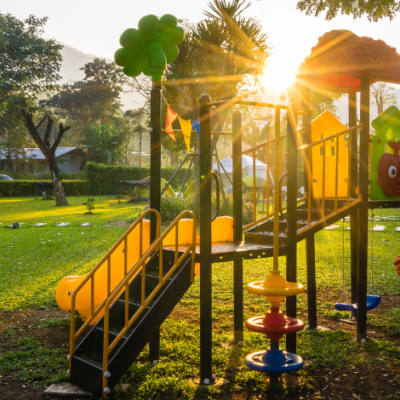We at the Manthena American School in Sharjah believe that playing is a crucial part of a child’s growth. This is why we place a high value on giving our students lots of opportunities to exercise and think critically on the playground. We are aware that outdoor play is crucial for a child’s cognitive, social, and emotional development in addition to being good for their physical health. A variety of activities are available on our cutting-edge playground to encourage gross motor skills, creativity, and problem-solving skills. We make sure that our playground is secure and offers a space where students can develop academically and socially. We’ll look at the benefits of playground play for kids’ physical and mental development in this blog.
Benefits of Outdoor Play:
- Improves Physical Health: Playing outside on the playground encourages physical activity, which can lower the risk of childhood obesity and other health-related problems.
- Enhances Creativity: Children can employ their imaginations and creativity during outdoor play, which can aid in the development of problem-solving and critical-thinking abilities.
- Playing with others on the playground can assist kids in building social skills including empathy, teamwork, and communication.
- Spending time outdoors in the sunshine and fresh air might help children feel less anxious and stressed.
- Encourages Exploration: Children have the chance to learn about their surroundings and themselves through outdoor play.
Physical Development on the Playground
- Enhances Motor Skills: Jumping, climbing, and other playground activities can aid in a child’s development of their gross motor skills.
- Enhances Balance and Coordination: Playing games that call for balance and coordination, such as balancing on a beam or scaling a ladder, can aid a child’s physical development.
- Strengthens Muscles: Physical activity is important for a child’s physical development and can aid in the growth and strengthening of muscles.
- Increases Endurance: Playground physical activities can increase a child’s stamina and endurance.
- Develops Spatial Awareness: Playground games like tag or going through obstacle courses can aid in a child’s coordination and development of spatial awareness.
Playground Activities that Promote Gross Motor Skills:
- Climbing: Playground features like ladders, ropes, and rock walls can aid in a child’s coordination and upper body strength development.
- Swinging: Swinging on monkey bars or swings can aid in a child’s coordination, balance, and core strength development.
- Running: Games like tag and running can help kids build their cardiovascular stamina and enhance their overall physical health.
- Jumping: Children’s leg strength, coordination, and balance can be developed by jumping off platforms, over obstacles, or while playing hopscotch.
Social and Emotional Development through Playground Play
- Encourages Cooperation: Children can learn to cooperate with others through playground activities like team games and building constructions.
- Increases Confidence: By attempting novel playground activities, such as climbing higher or swinging more quickly, kids can increase their self-confidence.
- Empathy is developed when kids play with other kids on the playground because it teaches them to recognize and respect other people’s emotions.
- Fosters Friendships: The playground can be a location where kids can meet others and form social bonds, which can improve their emotional health in general.
Importance of Unstructured Playtime
- Encourages Creativity: Children can utilize their imaginations and develop their creativity on the playground without being constrained by rules or norms.
- Promotes Independence: By giving kids the freedom to choose the activities they wish to participate in, unstructured playtime can aid in the development of their independence and problem-solving abilities.
- Reduces tension: By engaging in things they enjoy without the pressure of rules or guidelines, children have the chance to unwind and reduce tension during unstructured playtime.
- Self-Regulation Abilities Development: By giving kids the freedom to control their own emotions and behavior while playing freely, unstructured playtime can aid in the development of self-regulation abilities in kids.
Enhancing Cognitive Development on the Playground:
- Enhances Memory: Children can improve their memory and recall skills by engaging in problem-solving playground activities like completing obstacle courses.
- Improves Attention span: By engaging in activities that call for sustained concentration, children playing outside on the playground can increase their attention span and focus.
- Playground activities can encourage a child’s curiosity and drive to learn by giving them the chance to explore and learn new things.
- Develops Decision-Making Skills: By giving kids the freedom to choose which activities to participate in and how to approach them, playground play can aid in the development of children’s decision-making abilities.
Playground Safety Measures:
- To guarantee that kids are playing safely and adhering to the rules, a qualified staff member is required to supervise the playground.
- Regular Inspections and Maintenance: Regular playground equipment inspections and maintenance can help prevent accidents brought on by worn-out or broken equipment.
- Playgrounds should be made to accommodate different age groups so that kids can engage in activities that are appropriate for their age and developmental stage.
- Safety Rules: There should be clear safety rules posted and followed on the playground, such as no pushing, no running in wet areas, and no climbing on non-climbing equipment.
Encouraging Playtime for a Healthy Lifestyle:
- Establishing a schedule: Helping kids develop a schedule that includes regular playing will aid in developing a habit of physical activity, which can support a healthy lifestyle.
- Making it Fun: Children are more likely to enjoy physical activity when playtime is enjoyable, and they may continue to enjoy physical activity throughout their lives.
- Promoting Physical Activity as a Healthy Lifestyle Choice: Parents and instructors should be urged to provide a positive example for their students by participating in physical activity with them.
- Creating Opportunities: Giving kids the chance to engage in physical exercise through organized sports or other outside activities can motivate them to do so and help them grow a love for leading an active lifestyle.
Conclusion:
As a result, children benefit greatly from playground play in terms of their physical, social, emotional, and cognitive development. At Manthena American School, we promote regular physical activity among our pupils because we recognize the value of outdoor playing for kids’ overall development. We want to assist our students improve their physical and mental capabilities, social and emotional skills, and a love for an active lifestyle that they may carry into adulthood by providing a safe and exciting playground environment.







